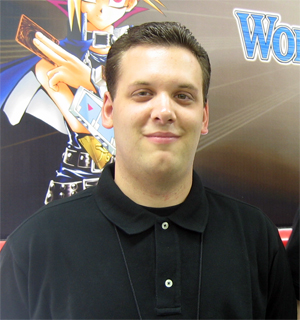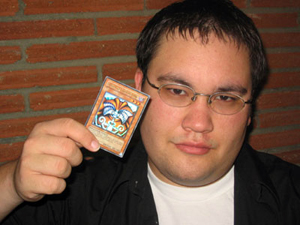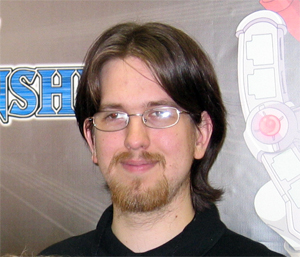In the past, Metagame.com has covered notable players, deckbuilders, and sometimes the duelist-on-the-street, but we haven’t yet turned the spotlight on a class of people that help keep Organized Play going—the judges!
Profiling every judge out there would be an overwhelming task. However, for the next few weeks, I’ll be bringing you a series of interviews with Yu-Gi-Oh!’s Level 3 judges. You’ve seen them at events, you’ve read their posts online, and you’ve asked them for rulings. Now, here’s your chance to learn a little more about them!
Let’s begin with Metagame.com’s ownCurtis Schultz! Many of you already know him as a rules representative on the Upper Deck Entertainment judge’s email list. Why don’t we find out a little bit more about him?
Curtis lives in Arizona, where he works in manufacturing at Intel.
 When and where did you pass the Test™?
When and where did you pass the Test™?
“I passed it at Origins in Columbus, Ohio, at Yu-Gi-Oh! Nationals 2004.”
How long have you been judging Yu-Gi-Oh!?
“I’ve been judging since the original release of Legend of Blue-Eyes White Dragon.”
Where and how often do you judge? Do you judge mainly locally, or do you travel to a lot of events?
“I judge a weekly event at a local card shop—‘Cards and Collectables’ in Mesa. Due to my work, I’m not often able to travel for events, since I have to use vacation time whenever I do so.
“Arizona no longer has a Premiere Tournament Organizer, so as a result, we no longer have any large local events. When we were running Regionals, I was normally the head judge for the event. The first time I was quite nervous about it, since I had never been the head judge of such a large event before, but the PTO, Ray Powers, had run events for other companies for many years and he really helped me learn.
“Naturally, I still have a great deal to learn.”
What was your pre-judging background? Did you like to play? Were you good? Have you won any tournaments?
“I played during Season 2 of the old system, judging on Saturdays and playing on Sundays. I won a trophy for my play on Sundays. I think I was about average, but I consistently placed high enough to take the trophy based on points.
“I played in one Regional—the first one held in Las Vegas. I didn’t do well, but I wasn’t surprised. I had begun working on Sundays, and because of that I’d committed myself to focus on judging. It had been quite a while since my last tournament at that point. I haven’t played in any large events since then.”
What’s your judging background?
“I began with small weekend tournaments at a place called ‘Dave’s Card Shop’ in Phoenix, Arizona.”
What’s your favorite part of being a judge?
“I’d say whenever a player learns something, or when they appreciate the consistency of rules and regulations.”
What’s your least favorite part of being a judge?
“Performing deck checks on fusion decks with 50 or more cards. I expect that one day we’ll see a fusion deck’s mass collapse, and it will form a small black hole.”
Does any one event stick out in your mind?
“Worlds 2005 in Japan. It’s hard to top that one. Nationals in 2004 stands out as the hardest event that I have ever worked. I really learned a lot that day.”
What’s the biggest contribution that Level 3 judges can make to the game and to the judge program?
“Assisting other judges at the higher level events. Some judges, like myself, have never performed this kind of work before and the experience is completely new to them.”
Have you had any memorable tournament moments? Tell us a good judge story or two!
“I once fielded a dispute between two players who could not agree on how many games they had played. Neither player had done a good job of tracking the games (calculators ruin everything) so I had to have each player recount the events of the games. It turned out that one of the players couldn’t recall my having been called in for a ruling during one of their games. It was a ruling that required me to explain how Dark Ruler Ha Des works. I ultimately ruled in favor of three games played, based on the account of the player who actually remembered me having been involved in a game.
“At one of our Regionals in Arizona, the lights went out in the auditorium twice. It turns out that there was a touch-screen system with a proximity detector that would turn off the lights if you stood in front of it for too long.”
Which Yu-Gi-Oh! card best illustrates who you are?
“I’m holding it in my Metagame picture (Ojama Green). I can’t really explain what drew me to the Ojamas—maybe it’s because I can use them to really annoy people. I’m looking forward to seeing how Chazz makes them work in Yu-Gi-Oh! GX.”
Next up, we’ve got Robert Harder. He hails from Portland, Oregon, where he works as the head lifeguard for Portland Community College.
 When and where did you pass the Test™?
When and where did you pass the Test™?
“I passed the Level 2 test at US Nationals 2004, then passed the Level 3 test in the spring of 2005. I was able to take it from Tim Shields, my Premier Tournament Organizer. I passed it with 96 percent. I misread one question, or it would have been 100 percent.”
How long have you been judging Yu-Gi-Oh!?
“I’ve been judging for about two years now. It started when I would help run in-store events, Hobby Leagues, and other tournaments.”
Where and how often do you judge? Do you judge mainly locally, or do you travel to a lot of events?
“I mainly judge locally. I help out my local shops by judging both sanctioned and non-sanctioned events. I have traveled a lot, but always to play—I played in Nationals 2004 and 2005. I did want to help judge after the event, but didn’t want to waste my invite.
“I would love to travel and help run events. I would love to see the chance for Level 3 judges to work at more Premier Events and Shonen Jump Championships, since I keep hearing horror stories from events that didn’t have judges involved with running them.”
What was your pre-judging background? Did you like to play? Are you good? Have you won any tournaments?
“When I don’t judge, I can be found playing. I’m pretty good, since I’m ranked in the top five in my state. I won the last two Oregon Regionals in 2004 and 2005. Going 10 and 0 at Regionals? You decide. I played this year at US Nationals. I had an off day where I only made the top 100, but I did knock out Wilson Luc.”
What's your judging background?
“I’ve judged at a lot of leagues and premier events. I’ve also spent some time teaching people the game in the shop, as well as running online tournaments.”
What's your favorite part of being a judge?
“I love helping the players and the game grow. You learn a lot about different metagames and how different people play. I also think it’s very important to take extra time to make sure players know ‘why’ the ruling is the way it is.”
What's your least favorite part of being a judge?
“Parents. Once when I was working a prerelease event, I had a father become almost belligerent, because his son didn’t pull all the holos in the packs he received at the event. I also get tired of players trying to call ‘every little thing’ on an opponent in an attempt to weasel a game loss for him or her.”
Does any one event stick out in your mind?
“Yes, I call it ‘Anti-Spell versus Wave-Motion Cannon.’
“This happened at a Cybernetic Revolution prerelease tournament. To make a long story short, time was called in a match, so the game went to ‘sudden death.’ Player A wanted to use Wave-Motion Cannon to finish the game and Player B wanted to chain with Anti-Spell to stop the Wave-Motion Cannon. David Buzzelli (another Level 3 judge) and I began talking about the game mechanics, discussing whether or not you could play it, due to timing. Needless to say, Bryan, a Level 1 judge, walked by and said, ‘It removes spell counters.’ We both had forgotten to read the entire card, which would have shown that Wave-Motion Cannon doesn’t use spell counters.”
What's the biggest contribution that Level 3 judges can make to the game and to the judge program?
“Help train new judges! Sharing your experience with others is important. Keep in mind that being a Level 3 judge doesn’t mean you know everything. You should always keep an open mind and listen to others. As judges, we’re not perfect, but we should always be professional. Step back, and let your judges-in-training step up to the plate and shine. Always keep a positive attitude and smile—a smile will make the day go by faster.”
Tell us an interesting and little-known personal fact about yourself:
“I use my Tournament Pack 3 Needle Worms as coasters. They’re great for parties! I also own and run YGONorthWest.com. Many times people will tell me about this ‘new website’ and ask if I am a member.
Which Yu-Gi-Oh! card best illustrates who you are?
“I’ve always liked Exodia the Forbidden One. Exodia was my first real deck. It’s different, something that you don’t see coming until it’s too late. Exodia the Forbidden One, I'm ‘The One’ (nick name). If Exodia is my player side, then Royal Decree would have to be my judge side. Many judges associate with Judge Hand, Solemn Judgment, and Judge Man. Mine is definitely Royal Decree—often as head judge, my Royal Decree is final. Tournament Pack 4, no less!”
Next up, I’d like to welcome Jon Lacey. I’ve worked with him at a number of events, including this year’s World Championships.
Jon lives in Chicago, Illinois, where he works in customer service for a supermarket chain. Let’s learn more!
 When and where did you pass the Test™?
When and where did you pass the Test™?
“I passed the Level 3 test at Wizard World Chicago 2004.”
How long have you been judging Yu-Gi-Oh!?
“I began judging Yu-Gi-Oh! unofficially at my local comic shop, when the manager (a Yu-Gi-Oh! player himself) decided that he wanted to start holding tournaments on the weekends. This was shortly after the release of Magic Ruler. I was the only person that people trusted to rule accurately and consistently, so I sort of got roped into the job, but I enjoyed it and I’ve been doing it ever since.”
Where and how often do you judge? Do you judge mainly locally, or do you travel to a lot of events?
“I judge for Pastimes, which is based in Niles, IL (a northern suburb of Chicago). We handle Upper Deck Entertainments premier events for Illinois, Iowa, Indiana, and northern Missouri. I have a tournament of some sort or another (usually Upper Deck Entertainment events, but I also judge Magic) every week. Since we cover such a large area, I do end up doing a lot of traveling. I also attend the random convention.”
What was your pre-judging background? Did you like to play? Were you good? Have you won any big tournaments?
“I used to play Yu-Gi-Oh! casually. I started with the Japanese GBA games, figuring out card effects and rules through trial and error, but being unable to read Japanese didn’t help matters much. When the game was released in the US, the card text became a great deal more readable, even if the accuracy of the rules didn’t improve by much for some time after that. I've never played in any big tournaments, but I was a reasonably good player in my area.”
What’s your judging background?
“The first official tournament that I judged was a Regional tournament (the first one in our area actually) on January 10, 2004. This was pre-floor rules, pre-penalty guidelines, and pre-working version of MANTIS. It was truly a unique experience, and it just got better from there.”
What’s your favorite part of being a judge?
“I enjoy being able to shape the game and the players into a healthy, friendly, and competitive atmosphere. Our players have a good time at our events and they have confidence in both my staff and myself. Personally, I think when you can get hundreds of people to agree on something like that, you're doing something right.”
What’s your least favorite part of being a judge?
“Every once in a while one of our players will step over the line of acceptable behavior, and I have to issue that most final of penalties—the disqualification. I hate doing this. I want people to have a good time at our events, not get kicked out of them.”
Does any one event stick out in your mind?
“Worlds 2005. It was definitely one of the most unique tournament experiences that I’ve ever had.”
What’s the biggest contribution that Level 3 judges can make to the game and to the judge program?
“Level 3 judges are in the best position to grow the game both in their areas and elsewhere, by educating both players and judges about the intricacies of the rules of this game. They’re also responsible for training other judges, who in turn train others, and so on down the line. A good Level 3 judge will be able to surround him- or herself with intelligent judges who are on the road to becoming Level 3 judges, and who will eventually make it.”
Tell us an interesting and little-known personal fact or two about yourself.
“I have no depth perception. This means that I see everything in two dimensions, giving me the incredible, amazing, comic-book-like ability to stare at computer screens (or cards) for hours on end without straining my eyes. I’m determined to use this power only for good.”
To see us out the door for this week, let’s meet Dave Buzzelli! Robert mentioned Dave in his interview, so now is a good time to learn a little bit more about him. Dave also lives in Portland, Oregon and focuses his time on being a stay-at-home dad, bringing his son back and forth between school and sports.
When and where did you pass the Test™?
“I passed it on August 2, 2005. The same thing happened when I passed Level 2—it took about as long to get the info updated.”
How long have you been judging Yu-Gi-Oh!?
“I’ve been judging for almost a year.”
Where and how often do you judge? Do you judge mainly locally, or do you travel to a lot of events?
“I mostly judge local Regionals and Sneak Preview events.”
What was your pre-judging background? Did you like to play? Were you good? Win any big tournaments?
“I started playing at the end of Legacy of Darkness, and seriously played with Pharaonic Guardian. That’s why I started judging. I also play in local tournaments and enjoy them.”
What’s your judging background? Did you start out at league tournaments, or mostly Regionals and other events like them?
“I started judging Sneak Previews along with Robert (Harder), the other Level 3 judge in Oregon, then progressed to judging Regionals.”
What’s your favorite part of being a judge?
“Judging lets me see the variety of decks that people play with. It puts a smile on your face when you see someone play an offbeat deck that takes people by surprise. I also love when you get to see a really good game, especially when it’s in the Top 8.”
What’s your least favorite part of being a judge?
“I hate having to give out game loss penalties for incorrect paperwork. It’s the little things that count.”
Does any one event stick out in your mind?
“Shonen Jump Championship Seattle!”
What’s the biggest contribution you think Level 3 judges can make to the game, and to the judge program?
“Providing guidance to up-and-coming judges. When playing locally, judges should teach people to play as if they had a judge standing behind them watching.”
Have you had any memorable tournament moments? Tell us a good judge story or two!
“At Shonen Jump Championships in Seattle, there was a ruling handed down by the head judge that I didn’t agree with, but I had to uphold it. I kept my mouth shut, but it turned out that I was right. Next time, maybe I won’t be so quick to keep my mouth closed!”
Tell us an interesting and little-known personal fact or two about yourself:
“I’m basically a homebody, just tryin’ to keep the kid on the right track.”
Which Yu-Gi-Oh! card best illustrates who you are?
“Book of Moon. The whole reason I got into judging was because I wanted to clarify what I could and couldn’t do with this card. The rest is history.”
I wager you now know more about these guys now than you did before! If you see them at your events, introduce yourself and say hi. Judges always like to see a friendly face. I’ll continue to profile four or so judges in each column, so make certain you come back next time. Perhaps your local Level 3 judge will get his or her chance in the spotlight!
Want to give me some feedback or suggestions, or maybe beg to see a particular judge get interviewed sooner rather than later? Email me at MetagameJulia@gmail.com and pass it along!